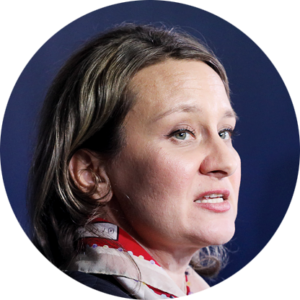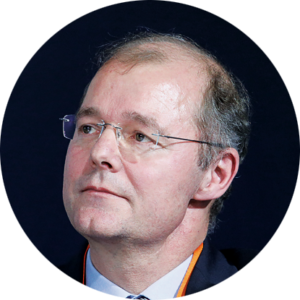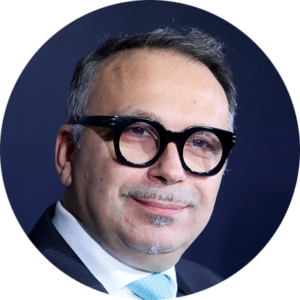If human population growth continues at the current pace, the world will run out of food by 2050.
New ways of growing and transporting food are helping address the problem and Ukraine, long known as the ‘breadbasket of Europe,’ plays a key role in developing more efficient models.
“Agriculture is a very critical sector for Ukraine and innovation is key for its development,” Sonja Caymaz, Senior Editor at Longitude, Financial Times Group, said to launch the Future of Food panel at the Kyiv Post’s eighth annual Tiger Conference on Dec. 10 at the Unit.City innovation park in Kyiv.

“There are two types of innovation that are very relevant here: One is the technology and the digitization and the robots and the sensors, and then you have the food itself and the science behind it.”
Sonja Caymaz
Senior editor at Financial Times Group
The panel speakers represented a range of food-related industries, including Andreas Huber, an Integrated Field Sciences EMEA Leader at Corteva Agriscience, the largest single-service agricultural company in the world; Yulia Badritdinova, the Managing Director of McDonald’s in Ukraine; Alessandro Zanelli, the CEO of Nestle in Ukraine and Moldova and Tino Zeiske, the CEO of METRO Cash & Carry Ukraine, the wholesale division of the German METRO Supermarkets.
Caymaz launched the discussion by noting that 57% of surveyed Ukrainians reported they would increase their food budget to buy sustainably produced food. While the majority responded that they would spend between 1% and 20% more for sustainable products, 32% said they would spend over 20% more on sustainable food, which exceeds the proportion of people who would do so across Europe as a whole.
Yet Ukrainian farmers lag behind in responding to consumer trends, with only 28% reporting that they evaluate trends compared with 42% of farmers in Europe as a whole.
Corteva, which promotes gene-edited foods as a solution to population growth, said responding to consumer demands for safe and environmentally friendly products is a priority for the company that must be balanced with innovations to maximize crop yields.
“Sustainability is the basis of any agricultural activity in the world… we cannot afford simply to reduce yields, food needs to come from somewhere when we will have 10 billion people. I would hate to see agriculture consume the last undeveloped lands in the world,” said Huber.

“It’s clear now to everyone that we cannot increase yields forever, infinitely, without considering the very basis of agricultural production, which is healthy soil, water resources, healthy biodiverse ecosystems around the agricultural systems.”
Andreas Huber
Integrated field sciences leader at Corteva Agriscience
However, without public trust, innovations can fail quickly. He called on the public to trust science when it comes to the viability of agritech in the industry.
For McDonald’s Ukraine, the emphasis is on maintaining supply models that are in line with the company’s commitment to customer service. ‘When we talk about innovation, there’s a slightly longer way for delivering that to our customers… it must work inside our business model at the same level or even better,” Badritdinova said.
A major factor for McDonald’s customer experience is the freshness of the company’s food. To support that, the company sources 70% of its ingredients locally.

“We are trying to make the service even faster and even better, and this is also the direction for innovation for us.”
Yulia Badritdinova
CEO at McDonald’s Ukraine
Yet while McDonald’s is largely sticking to the meat-based products that made the company famous, plant-based proteins are another major trend in sustainability from both health and environmental impact perspectives and Nestle has created the plant-based ‘impossible burger’ to respond to these new demands.
METRO Cash & Carry is also reorienting towards market demand for fresh, unprocessed fruits, vegetables and meats. While customers report that they are willing to spend more for fresh products, Zeiske noted that isn’t always borne out by their behavior in stores.

“The secret for METRO is to be very strong in the fresh food business… It all starts with ourselves, with the way we are educating our kids and the way we are interacting with our customers and consumers.”
Tino Zeiske
CEO at Metro Cash & Carry Ukraine
The panelists agreed that Ukraine has particular potential to push the food industry forward, with great agricultural resources laying the foundation for growth in agri-tech and crop replacements (like sunflowers for soybeans) to promote sustainability.
“Grains and brains are the richest part of Ukraine… If we are able to find a way to enable sustainable quality standards, Ukraine will have a fantastic business opportunity,” Zanelli said.

“Consumers want to see the action, because the days in which we were telling consumers what the brand stands for are finished. Now consumers are telling to each other in social media, in different ways what the brand stands for, what the product stands for. So our reputation is built on our action, the element of transparency.”
Alessandro Zanelli
CEO at Nestle in Ukraine & Moldova
